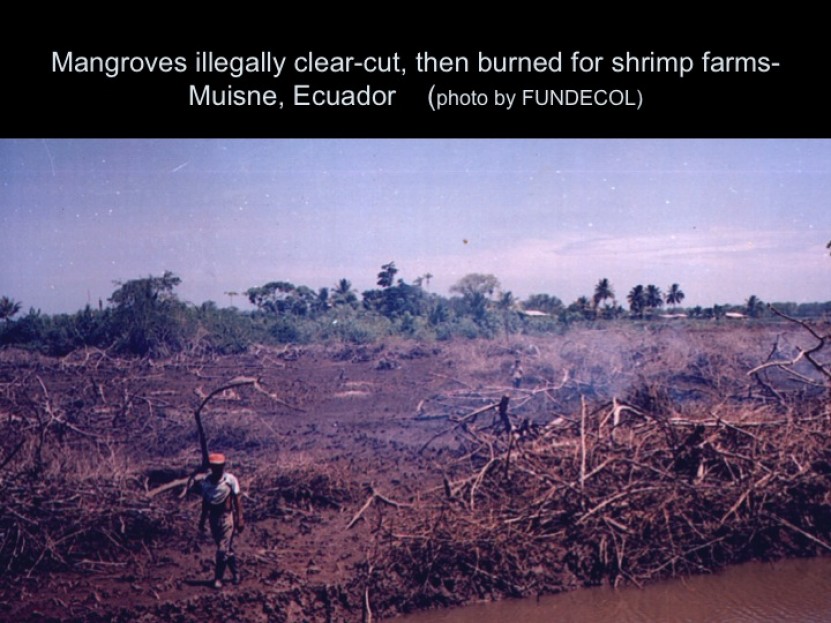Endorsements Needed to Protest Against Greenwashing of Shrimp Certification Standards

Note: Shrimp Farming Is Destroying Shark Habitat & Nursery Grounds
AN OPEN LETTER TO THE GENERAL STEERING COMMITTEE OF THE
WWF SHRIMP AQUACULTURE DIALOGUE
4th May, 2011
Dear ShAD/GSC members,
After careful and considered reflection on the draft standards and the
whole WWF-ShAD (Shrimp Aquaculture Dialogue) process, we the undersigned
Conscientious Objectors -- NGOs working with local communities in the
shrimp producer-nations and consumers in the shrimp-importing nations --
have unanimously decided that we cannot support the ShAD General Steering
Committee (ShAD/GSC) and the Aquaculture Stewardship Council’s (ASC)
intentions or actions towards establishing standards for shrimp aquaculture
certification. Many others who have added their names and organizational
affiliations to our list have also joined us in our protest.
We must therefore continue our course to speak out publicly and campaign
against the intent and the process that WWF-ShAD has endeavoured to
undertake. The historical record and scientific evidence both indicate that
certification will do much harm to both Local Resource Users and the
coastal marine environment. The following reasons stand out among many
others as indicators that we COs must continue to strongly oppose the ShAD
process and the intended ASC and organize a wider resistance against ShAD
and other shrimp certification schemes in both Europe and the USA:
1. There has never been involvement nor representation in WWF-ShAD’s socalled
dialogue process for the majority of stakeholders or, more
aptly, the Local Resource Users who are adversely affected by the
shrimp industry in producer nations. ShAD’s “stakeholders” are
overwhelmingly those invested in the growth of the shrimp-export
industry.
2. With each revision to the draft, the standards and their evaluation
criteria have been progressively and deliberately diluted by the GSC to
ensure that at least 20% of the existing shrimp industry can be
certified immediately after the Standards are released. The process
clearly demonstrates the bias of the ShAD/GSC.
3. The ShAD/GSC has resolutely refrained from undertaking or commissioning
serious research to collect meaningful and verifiable inputs and
feedback from Local Resource Users in the manner prescribed by The
Economics of Ecosystems and Biodiversity (TEEB).
4. The GSC process for selecting its board members has not been fair from
the beginning and is not representative of a transparent and democratic
process. As such, the standards overwhelmingly represent industry
interests -- for example: the whole of Africa is “represented” on the
ShAD/GSC by shrimp industry nominees from Madagascar.
5. Continued lack of proper legislation and enforcement in producernations
makes adherence to any certification standard unfeasible.
6. ShAD puts too much trust in the industry to monitor and regulate
itself. The certification programme depends upon an untried and
untested auditing system. Other critical aspects of the process too
require a “leap of faith” -- that previously disastrous practices will
miraculously reverse their effects once the ShAD standards are
released.
7. The ShAD standards continue to perpetuate unsustainable and destructive
open-throughput systems of aquaculture -- with a legacy of 400,000
hectares (and counting) of abandoned ponds in producer-nations.
1
The standards also promote bad practices relating to so-called
“mitigation of the effects of mangrove loss”.
8. The process conveniently ignores wide-spread community displacement,
human rights violations and environmental damage to many thousands of
hectares of land by the shrimp industry prior to 1999. Under the
present standards, ponds in these regions could be certified. Trends
indicate that they will. The ASC becomes, therefore, a confessional for
the shrimp industry and will grant indulgences in the form of
certification.
9. Export-oriented tropical shrimp production does not contribute towards
food security. Food security should not be measured by the weight of
export-production or the profit-curve of the industry, but instead by
the availability of healthy and sustainable means of local food
production for local consumption.
10. There remains the great risk that WWF-ShAD certification, by placing a
green stamp on tropical shrimp, will actually expand the demand for
farmed tropical shrimp -- both certified and uncertified -- thus
promoting the continued (and possibly more rapid) expansion of
unsustainable practices.
11. Feed issues are still not satisfactorily resolved and there is still no
effective plan to meet increasing feed demands. The projected reliance
on GM soy and palm oil is of great concern.
12. The COs had requested a breakdown of development time spent by ShAD in
developing their social, environment and technical standards. We have
not received this, yet.
13. ShAD/GSC and their offspring in the ASC have still not taken any direct
and effective actions to influence consumers in the importing nations
to reduce shrimp consumption -- extremely pertinent to the intent and
purposes to any attempt at designing a certification program for
shrimp.
We reiterate our demands that shrimp farming should not be located
within the inter-tidal zone; it should not be allowed to affect productive
agricultural lands, or displace members of local communities.
The final draft standards represent an extremely crude attempt at
setting up “standards”. The process demonstrates a lack of careful thought
and consideration of ground realities and concern for Local Resource Users
-- people who will suffer the consequences of WWF-ShAD’s actions.
The GSC’s position that the standards will be released regardless of
their merit and consequences leaves little scope for further dialogue.
As such, we the undersigned Conscientious Objectors reject the WWF-ShAD
process and its shrimp aquaculture standards.
We reaffirm our support, as always,
For the mangroves and mangrove communities,
The Conscientious Objectors



